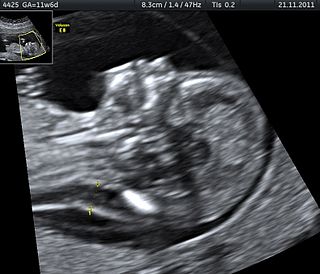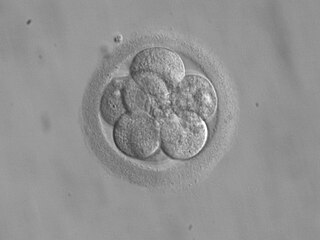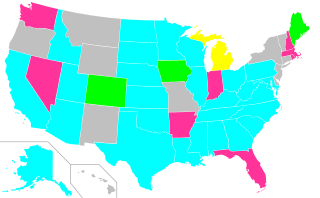
A multiple birth is the culmination of one multiple pregnancy, wherein the mother gives birth to two or more babies. A term most applicable to vertebrate species, multiple births occur in most kinds of mammals, with varying frequencies. Such births are often named according to the number of offspring, as in twins and triplets. In non-humans, the whole group may also be referred to as a litter, and multiple births may be more common than single births. Multiple births in humans are the exception and can be exceptionally rare in the largest mammals.

Stillbirth is typically defined as fetal death at or after 20 or 28 weeks of pregnancy, depending on the source. It results in a baby born without signs of life. A stillbirth can often result in the feeling of guilt or grief in the mother. The term is in contrast to miscarriage, which is an early pregnancy loss, and Sudden Infant Death Syndrome, where the baby dies a short time after being born alive.
The abortion debate is a longstanding, ongoing controversy that touches on the moral, legal, medical, and religious aspects of induced abortion. In English-speaking countries, the debate most visibly polarizes around adherents of the self-described "pro-choice" and "pro-life" movements. Pro-choice supporters uphold that individuals have the right to make their own decisions about their reproductive health, and that they should have the option to end a pregnancy if they choose to do so, taking into account various factors such as the stage of fetal development, the health of the mother, and the circumstances of the conception. Pro-life advocates, on the other hand, maintain that a fetus is a human being with inherent rights that cannot be overridden by the mother’s choice or circumstances, and that abortion is morally wrong in most or all cases. Both terms are considered loaded in mainstream media, where terms such as "abortion rights" or "anti-abortion" are generally preferred.

The Unborn Victims of Violence Act of 2004 is a United States law that recognizes an embryo or fetus in utero as a legal victim, if they are injured or killed during the commission of any of over 60 listed federal crimes of violence. The law defines "child in utero" as "a member of the species Homo sapiens, at any stage of development, who is carried in the womb."

Pregnancy is the time during which one or more offspring develops (gestates) inside a woman's uterus (womb). A multiple pregnancy involves more than one offspring, such as with twins.
Fetal rights are the moral rights or legal rights of the human fetus under natural and civil law. The term fetal rights came into wide usage after Roe v. Wade, the 1973 landmark case that legalized abortion in the United States. The concept of fetal rights has evolved to include the issues of maternal substance use disorders, including alcohol use disorder and opioid use disorder. Most international human rights charters "clearly reject claims that human rights should attach from conception or any time before birth." While international human rights instruments lack a universal inclusion of the fetus as a person for the purposes of human rights, the fetus is granted various rights in the constitutions and civil codes of several countries.
The born alive rule is a common law legal principle that holds that various criminal laws, such as homicide and assault, apply only to a child that is "born alive". U.S. courts have overturned this rule, citing recent advances in science and medicine, and in several states feticide statutes have been explicitly framed or amended to include fetuses in utero. Abortion in Canada is still governed by the born alive rule, as courts continue to hold to its foundational principles. In 1996, the Law Lords confirmed that the rule applied in English law but that alternative charges existed in lieu, such as a charge of unlawful or negligent manslaughter instead of murder.
Abortion is illegal in El Salvador. The law formerly permitted an abortion to be performed under some limited circumstances, but in 1998 all exceptions were removed when a new abortion law went into effect.
In Judaism, views on abortion draw primarily upon the legal and ethical teachings of the Hebrew Bible, the Talmud, the case-by-case decisions of responsa, and other rabbinic literature. While all major Jewish religious movements allow or encourage abortion in order to save the life of a pregnant woman, authorities differ on when and whether it is permitted in other cases.
Pregnancy rate is the success rate for getting pregnant. It is the percentage of all attempts that leads to pregnancy, with attempts generally referring to menstrual cycles where insemination or any artificial equivalent is used, which may be simple artificial insemination (AI) or AI with additional in vitro fertilization (IVF).

The beginning of human personhood is the moment when a human is first recognized as a person. There are differences of opinion as to the precise time when human personhood begins and the nature of that status. The issue arises in a number of fields including science, religion, philosophy, and law, and is most acute in debates relating to abortion, stem cell research, reproductive rights, and fetal rights.
Fetal abduction refers to the rare crime of child abduction by kidnapping of an at term pregnant woman and extraction of her fetus through a crude cesarean section. Dr. Michael H. Stone and Dr. Gary Brucato have alternatively referred to this crime as "fetus-snatching" or "fetus abduction." Homicide expert Vernon J. Geberth has used the term "fetal kidnapping." In the small number of reported cases, a few pregnant victims and about half of their fetuses survived the assault and non-medically performed cesarean.
Foeticide, or feticide, is the act of killing a fetus, or causing a miscarriage. Definitions differ between legal and medical applications, whereas in law, feticide frequently refers to a criminal offense, in medicine the term generally refers to a part of an abortion procedure in which a provider intentionally induces fetal demise to avoid the chance of an unintended live birth, or as a standalone procedure in the case of selective reduction.
Personhood is the status of being a person. Defining personhood is a controversial topic in philosophy and law and is closely tied with legal and political concepts of citizenship, equality, and liberty. According to law, only a legal person has rights, protections, privileges, responsibilities, and legal liability.

Colorado Amendment 62 was an initiated constitutional amendment that appeared on the November 2, 2010 ballot defining personhood as “every human being from the beginning of the biological development of that human being.” It sought to ban abortion in the state of Colorado and challenge Roe v. Wade.

Born alive laws in the United States are fetal rights laws that extend various criminal laws, such as homicide and assault, to cover unlawful death or other harm done to a fetus in utero or to an infant that has been delivered. The basis for such laws stems from advances in medical science and social perception, which allow a fetus to be seen and medically treated as an individual in the womb and perceived socially as a person, for some or all of the pregnancy.
Chemical endangerment is the crime of exposing a child to a controlled substance or an environment in which it is produced. It was added to the Alabama legal code in 2006, with the intention of protecting children from methamphetamine laboratories. Since then, it has been used to prosecute women who give birth to children that test positive for harmful drugs and also THC, the active ingredient in marijuana.
Bei Bei Shuai is a Chinese immigrant to the United States who became the subject of international public attention from 2011 to 2013, when the authorities of the state of Indiana charged her with murder and attempted feticide after her suicide attempt allegedly resulted in the death of the fetus with which she was pregnant. In Britain, The Guardian described Shuai's case, as well as those of other women who lose their pregnancies in cases of maternal drug addiction or a suicide attempt, as part of a "creeping criminalisation of pregnancy across America".
Purvi Patel is an Indian American whose conviction and sentence to 20 years in prison in Indiana for feticide and child neglect was overturned by the Indiana Court of Appeals. The court pointed out that the lower court's ruling had been an "abrupt departure" from the intent of the feticide law as shown by prior usage, which consisted of cases in which a pregnant woman and her unborn child were the victims of violence. The court also said that it was not possible to claim that lawmakers had intended the feticide law to be used to prosecute women trying to abort because the state abortion laws had already since the 1800s explicitly protected pregnant women from prosecution. "The state's about-face in this proceeding is unsettling, as well as untenable" under prior court precedent, Judge Terry Crone wrote in the ruling. The court said that Patel endangered the child by not seeking medical care but that prosecutors failed to prove that her failure to do so resulted in the child's death.
Alabama v. Jones was a U.S. legal case that took place in the state of Alabama. The case is notable as the first attempt, at least in the state, to charge a pregnant woman for suffering a miscarriage. The case was of special interest to feminist groups and reproductive rights groups. A grand jury charged her with manslaughter but the prosecutors ultimately dismissed the case.






